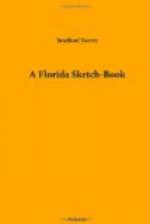As I approached the creek, a single spotted sandpiper was teetering along the edge of the water, and the next moment a big blue heron rose just beyond him and went flapping away to the middle of the marsh. Now, an hour afterward, he is still standing there, towering above the tall grass. Once when I turned that way I saw, as I thought, a stake, and then something moved upon it,—a bird of some kind. And what an enormous beak! I raised my field-glass. It was the heron. His body was the post, and his head was the bird. Meanwhile, the sandpiper has stolen away, I know not when or where. He must have omitted the tweet, tweet, with which ordinarily he signalizes his flight. He is the first of his kind that I have seen during my brief stay in these parts.
Now a multitude of crows pass over; fish crows, I think they must be, from their small size and their strange, ridiculous voices. And now a second great blue heron comes in sight, and keeps on over the marsh and over the live-oak wood, on his way to the San Sebastian marshes, or some point still more remote. A fine show he makes, with his wide expanse of wing, and his feet drawn up and standing out behind him. Next a marsh hawk in brown plumage comes skimming over the grass. This way and that he swerves in ever graceful lines. For one to whom ease and grace come by nature, even the chase of meadow mice is an act of beauty, while another goes awkwardly though in pursuit of a goddess.
Several times I have noticed a kingfisher hovering above the grass (so it looks, but no doubt he is over an arm of the creek), striking the air with quick strokes, and keeping his head pointed downward, after the manner of a tern. Then he disappeared while I was looking at something else. Now I remark him sitting motionless upon the top of a post in the midst of the marsh.
A third blue heron appears, and he too flies over without stopping. Number One still keeps his place; through the glass I can see him dressing his feathers with his clumsy beak. The lively strain of a white-eyed vireo, pertest of songsters, comes to me from somewhere on my right, and the soft chipping of myrtle warblers is all but incessant. I look up from my paper to see a turkey buzzard sailing majestically northward. I watch him till he fades in the distance. Not once does he flap his wings, but sails and sails, going with the wind, yet turning again and again to rise against it,—helping himself thus to its adverse, uplifting pressure in the place of wing-strokes, perhaps,—and passing onward all the while in beautiful circles. He, too, scavenger though he is, has a genius for being graceful. One might almost be willing to be a buzzard, to fly like that!
The kingfisher and the heron are still at their posts. An exquisite yellow butterfly, of a sort strange to my Yankee eyes, flits past, followed by a red admiral. The marsh hawk is on the wing again, and while looking at him I descry a second hawk, too far away to be made out. Now the air behind me is dark with crows,—a hundred or two, at least, circling over the low cedars. Some motive they have for all their clamor, but it passes my owlish wisdom to guess what it can be. A fourth blue heron appears, and drops into the grass out of sight.




